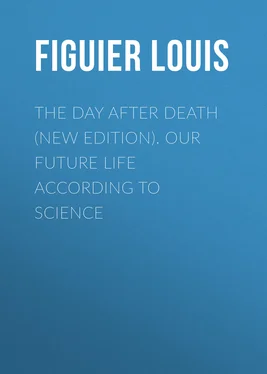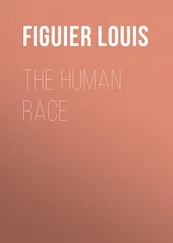Louis Figuier - The Day After Death (New Edition). Our Future Life According to Science
Здесь есть возможность читать онлайн «Louis Figuier - The Day After Death (New Edition). Our Future Life According to Science» — ознакомительный отрывок электронной книги совершенно бесплатно, а после прочтения отрывка купить полную версию. В некоторых случаях можно слушать аудио, скачать через торрент в формате fb2 и присутствует краткое содержание. Жанр: Эзотерика, foreign_religion, foreign_antique, foreign_prose, на английском языке. Описание произведения, (предисловие) а так же отзывы посетителей доступны на портале библиотеки ЛибКат.
- Название:The Day After Death (New Edition). Our Future Life According to Science
- Автор:
- Жанр:
- Год:неизвестен
- ISBN:нет данных
- Рейтинг книги:5 / 5. Голосов: 1
-
Избранное:Добавить в избранное
- Отзывы:
-
Ваша оценка:
- 100
- 1
- 2
- 3
- 4
- 5
The Day After Death (New Edition). Our Future Life According to Science: краткое содержание, описание и аннотация
Предлагаем к чтению аннотацию, описание, краткое содержание или предисловие (зависит от того, что написал сам автор книги «The Day After Death (New Edition). Our Future Life According to Science»). Если вы не нашли необходимую информацию о книге — напишите в комментариях, мы постараемся отыскать её.
The Day After Death (New Edition). Our Future Life According to Science — читать онлайн ознакомительный отрывок
Ниже представлен текст книги, разбитый по страницам. Система сохранения места последней прочитанной страницы, позволяет с удобством читать онлайн бесплатно книгу «The Day After Death (New Edition). Our Future Life According to Science», без необходимости каждый раз заново искать на чём Вы остановились. Поставьте закладку, и сможете в любой момент перейти на страницу, на которой закончили чтение.
Интервал:
Закладка:
But, it will be said, if superhuman beings are of no sex, how are they to be reproduced, how is the species to be kept up, and multiplied? There will be no need of reproduction, the species of the superhuman being will not require to be maintained, or multiplied. The reproduction, the preservation of his species is the business of the inhabitants of the inferior worlds, of the earth and the planets. Such is their lot, such the task imposed upon them by nature. But reproduction is unknown and unnecessary to the fortunate beings who dwell in the planetary ether. From the earth and the other planets fresh and ever fresh phalanxes are despatched to them. The battalions of the elect are recruited by arrivals from the lower worlds. Below is the multiplication of individuals; above is the sojourn of blessed beings, who have no need of maintaining their species, because the laws of their destiny differ from those which rule the lot of terrestrial man. Reproduction is the task of inferior worlds, permanence is the inheritance of the world above.
The Soul of the Superhuman Being. In an excellent volume of popular science, the Universe , by Dr. Pouchet, director of the Museum of Natural History at Rouen, we find a striking definition. Dr. Pouchet informs us that a German naturalist, Bremser, lays down, as a principle, that, in man, matter and spirit exist in almost equal parts; that is, to say, that man is half spirit and half matter. Bremser, in advancing this proposition, takes his stand upon the fact that, in man, it is sometimes spirit which governs and subdues matter, and sometimes matter which dictates laws to spirit, with equal power and success on the side of each. 3 3 "We must consider," says Bremser, "that man is not a spirit, but only a spirit limited, in different ways, by matter. In a word, man is not a god, but, notwithstanding the captivity of his spirit in his corporality, it retains sufficient freedom to enable him to perceive that he is governed by a spirit more exalted than his own, that is to say, by a God. "It is to be presumed, in the supposition that there will be a new creation, that beings far more perfect than those produced by preceding creations will see the light. In the composition of man, spirit holds to matter the proportion of fifty to fifty, with slight occasional differences, because it is now matter, and again spirit which predominates. In a subsequent creation, should that which has formed man not prove to be the last, there will apparently be organizations in which spirit will act more freely, and be in the proportion of seventy-five to twenty-five. "It results from this consideration that man, as such, was formed at the most passive epoch of the existence of our earth. Man is a wretched intermediary between animal and angel, he aspires to elevated knowledge, and he cannot attain to it; though our modern philosophers sometimes think so, it is really impossible. Man wishes to make out the primary cause of all that exists, but he cannot get at it. With less intellectual faculty, he would not have had the presumption even to desire to know these causes; and, if he were more richly endowed, they would have been clear to him."— L'Univers , pp. 760-761.
Admitting, with the German philosopher, that this relation is true, we would say, that, while in man the proportion of the soul is fifty in one hundred, this proportion, in the superhuman being, is undoubtedly from eighty to eighty-five in one hundred. Of course we only employ this valuation to make our idea comprehensible, and give these figures only to prove that facts in the intellectual order may be submitted to weight, measure, and comparison, all which the world supposes to be impossible.
The soul has a preponderating share in the superhuman being. That is what we need to know, and to remember. Let us now endeavour to analyze the soul of the superhuman being, as we have analyzed his senses.
If the senses of the superhuman being are numerous and exquisitely acute, the faculties of his soul, which are intimately allied to the exercise of the senses, and depend on their perfection, must also be singularly active and powerful. We know that in men the faculties of the soul are feeble and limited. We have so short a time to pass upon the earth, that very powerful faculties would be of no use to us; they would not have time to be developed, or efficaciously employed. But everything is magnified and elevated in the superior world which awaits us; consequently the faculties of the thinking creature who inhabits the realms on high must be numerous and of vast extent.
We must repeat, concerning the faculties of the soul of the superhuman being, what we have just said concerning his senses. The superhuman being must be provided with new faculties, and also those faculties which he has brought with him from the earth must be singularly perfected. To determine the nature and the object of the new faculties bestowed upon the superhuman being would be impossible, because those faculties belong to the superior world which is unknown to us; they respond to moral wants of which we have no conception. Let us, therefore, renounce all idea of discovering the nature of those new faculties, and content ourselves with examining the degree of perfection which may be attained by those faculties of the soul which actually belong to man.
Attention, thought, reason, will, and judgment, all which render us what we are, must acquire special force and sureness in the superhuman being. La Bruyère has said that there is nothing more rare in this world than the spirit of discernment ; which means that judgment and good sense are excessively rare. When we have lived for a while among men, we recognize how thoroughly well founded the saying is. We may safely assert, without being over-misanthropical, that among a hundred men there will be not more than one or two possessed of sound judgment. In the majority of instances, ignorance, prejudices, and passion contend with judgment, so that, as La Bruyère says, good sense is much more rare than pearls and diamonds. This great and precious faculty of judgment, in which the majority of human beings are deficient, cannot be wanting in the inhabitants of the other world; there it must be the universal rule, here it is the exception.
The most precious of all faculties, enabling us to form large and lofty ideas and comparisons, whose outcome is knowledge, is memory. But how imperfect, changeable, weak, and, one may say, sickly, is our memory! It is absolutely mute respecting the whole period which preceded our birth, and during which, nevertheless, we existed. It is also as silent respecting all that concerns the early portion of our life. We retain no recollection of the care which was lavished upon our childhood. A child who loses its mother in infancy has never known a mother; for it, the mother has never existed. If those who saw us in the cradle did not recount our actions during that period, we should be entirely ignorant of them. We have to witness the successive stages of infancy, the sucking child, the long clothes, the staggering steps, the little go-cart, in order to realize that we too have been like that infant, have gone through those stages of being. Memory, which is not developed at all in man until he is a year old, and which becomes extinct in old men, is subject, even when it is at its highest point of activity, to innumerable weaknesses, caused by illness or the want of exercise, so that in fact our hold of this faculty is always precarious. We cannot doubt that in the other life it will have the power, the certainty, and scope which it lacks here below.
At the same time, our memory will be enriched by a number of new subjects. The soul, beholding and understanding the worlds which surround it, will be able to fix the geography of all those different places in its memory. It will know the physical revolutions, the populations, and the legislation of these thousand countries. The superhuman being will know what exists in such planets and their satellites as come within his reach, or as he shall visit. Just as, in order to gain information, we visit America or Australia, so the superhuman being visits Mars or Venus, and furnishes his memory with millions of facts, which it retains and reproduces at will. What immense power must memory, always supplied and always ready at call, bestow on the mind and reason!
Читать дальшеИнтервал:
Закладка:
Похожие книги на «The Day After Death (New Edition). Our Future Life According to Science»
Представляем Вашему вниманию похожие книги на «The Day After Death (New Edition). Our Future Life According to Science» списком для выбора. Мы отобрали схожую по названию и смыслу литературу в надежде предоставить читателям больше вариантов отыскать новые, интересные, ещё непрочитанные произведения.
Обсуждение, отзывы о книге «The Day After Death (New Edition). Our Future Life According to Science» и просто собственные мнения читателей. Оставьте ваши комментарии, напишите, что Вы думаете о произведении, его смысле или главных героях. Укажите что конкретно понравилось, а что нет, и почему Вы так считаете.












